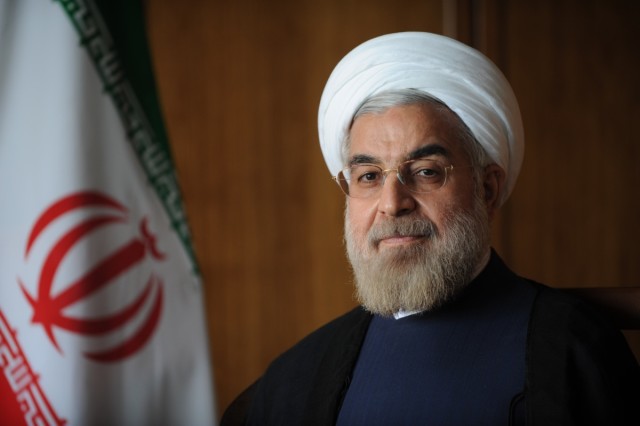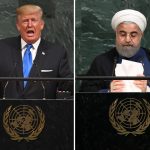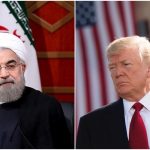by Djavad Salehi-Isfahani
The diplomatic push by Iranian President Hassan Rouhani to resolve the decade-long dispute over Iran’s nuclear program reached its zenith during his visit to New York in late September, exactly one year after Iran’s currency collapsed under the weight of US-led sanctions. Although the timing is largely accidental, the correlation between sanctions and Iran’s willingness to negotiate is not. These measures have clearly hurt Iran’s economy, and its leaders are searching for an agreement with the West that includes sanctions relief.
Much analysis of the reasons for Iran’s new conciliatory approach credits sanctions for the improved diplomatic prospects for reaching a deal. Where opinions differ is how to respond to Iran. Should the West begin with positive gestures and take steps to ease sanctions or tighten them to squeeze a better deal from an adversary in retreat. The question then becomes: whose side is time on?
As Vali Nasr argued forcefully in the New York Times last week, Tehran does not feel pressed for time on political grounds because it sees itself approaching new negotiations from a position of strength.
Only a few months ago, Iran concluded a landmark presidential election that brought to power a popular government much closer to the reformist camp than to the Supreme Leader, challenging the notion of the Islamic Republic as a political system in demise. The charm offensive in this case is an olive branch, not a white flag.
Those who believe that time is on the West’s side argue that Rouhani’s election is actually a sign of Iran’s desperation. They argue that Iran’s economy is in such dire circumstances that it has forced Ayatollah Ali Khamenei into a domestic compromise that makes an external one possible.
So how bad is the state of Iran’s economy, and will it collapse with more sanctions?
The “collapse” scenario, which at times excites US sanctions advocates into a frenzy like what we saw following the crash of the rial last October, is being revived as a way to dissuade the Obama administration from reaching a compromise with Iran too soon.
Iran’s economy is “already on the verge of collapse”, wrote the Times last week, failing to mention that it has been regarded as on that verge for quite some time. A Brookings report in 2009 called Iran’s economy “teetering”, when in fact it was one of the few countries in the world that was still growing after the Big Recession.
However, unlike political systems, economies do not collapse, they shrink. Economic activity in Iran declined by 2.9% last year (5.4% if you count oil activity) according to government figures, and unemployment is at historic levels, though not as bad as what we’re seeing in Greece or Spain.
If sanctions tighten, Iran’s economy will continue to slide for a year or two but will eventually reverse course. Per capita income will probably fall from about 20% below Turkey today to 30% below, but still more than 50% above that of Egypt. This doesn’t foreshadow a collapse as much as it does a slow adjustment to more difficult circumstances.
Positive steps to push Iran’s economy onto a recovery path were in fact taken in the last months of the Ahmadinejad administration and continue today. The rate of growth of Iran’s money supply and inflation started to fall before Rouhani took office. For the past three months, the average rate of inflation has been below 20% annually, about half of what it was in the months before.
The new economic team is also much more competent and looking in the right direction — to the private sector — for solutions to Iran’s economic problems.
Rouhani’s administration is the most business-friendly team to rule the Islamic Republic. The head of Iran’s Chamber of Commerce, Mohammad Nahavandian, is Rouhani’s chief of staff and the closest person to the president. The head of a private bank is also the governor of the Central Bank. Former president Hashemi Rafsanjani, whose men fill key posts in the new administration, encouraged the private sector to view Rouhani’s government as “family”.
Unemployment is approaching 20%, a record level, but will not surpass it. One reason is demography. For every person who entered retirement age in the last few years, 5 new people reached the working age. In the next few years this ratio will fall to 3, substantially reducing the pressure on the labor markets.
Future growth will also likely bring more jobs. After 2005, a large inflow of oil revenues opened a floodgate to cheap imports that hurt local production, causing jobless growth. Thanks to a more realistic value for the rial, the local production of most consumer goods has become more economical for local producers. The easing of sanctions, especially on the banking sector, would be of enormous help to these producers, but this will not be the game-changer.
In deciding how far they can push Iran, the P5+1 negotiating team should bear in mind another important fact about the political context in which the peace initiative of Iran’s new president is taking place. For Rouhani, reaching a compromise with the West is important, but not if it risks losing the support of his conservative rivals who are deeply suspicious of this process.
Rouhani sees his election as a historic opportunity to move Iran closer to a more pluralistic and tolerant society and not merely to settle the nuclear dispute. Forcing him to choose between making peace abroad and keeping it at home, which more sanctions would do, will not yield a better outcome for Iran or the West.






When ever I read posts like today’s, I ask myself if those people who make the decisions in congress, ever consider them, the posts/people who write them? It sure would be a better direction to take, then this constant piling on the negatives that these sanctions produce, for the everyday citizens to endure. It’s obvious who is beating the drums against seeking a diplomatic solution, which in my mind should preclude that segment, but I’m not of the inner circle, so it doesn’t matter what I think. If I was in that inner circle, I would beat the drum[s] to target those individuals/countries who only seem to know how to keep people down. There are more important things that the people of this planet are faced with, yet this constant finger pointing from some, while their own citizens endure hardship, only wastes time. resources, treasury. It’s time to change the thinking patterns, for the old ones are failures.
If I were Iran Supreme Leader, my thinking six months ago would go like this:
– Obama oil sanctions by themselves could work to strengthen the productive base of the Iranian economy and improve employment, by removing competition from cheap imported goods, made possible by petrodollars. But this,only if the upper middle class, mostly my bureaucrats, would not listen to the corrupt politicians and their western and Saudi friends and supporters. Unfortunately, A.N. has not followed my advice and has squandered the 62% political asset gained in last election, by playing into the hands of the reformists by using the huge budget over a beauty contest (increasing the bureaucracy) instead of using it in the service of creating real productive jobs for my impoverished real followers. VOA, BBC, AlJazeera and Radio Farda have poured in oil over fire and told my people that the key to prosperity is in the hand of the pro West opposition.
– The Iranians would fall in line behind their patriotic leaders and fight courageously when pushed to the corner by the foe or sense betrayed by false leaders who try to lead them to submission, like the other side of the P.G.
– Better not worry about the result of coming election. Let some honest politician who happens to think that there may still be hope in finding a reasonable side to the Obama administration, win the election.
– If the new President discovers this unlikely reasonable side, then Iran has found a shortcut to its goal and most Iranians would feel gratitude for my magnanimity in making all this possible.
– If, as I see more likely, the new President is cold-shouldered by Obama administration out of shear arrogance or out of the overwhelming weight of the A.Q. lobby (Bandar McG. Bibi), then the erroneous policy of putting hope in the west shall be exposed; my self-reliance policy vindicated; and those who had been the victim of temptation would gather around their patriotic leader to defend their civilization against the regional barbarism supported by the forces of The Dark Empire.
– Then would be the time to reap the hidden, god-sent benefits of oil sanctions. My people would then accept temporary economic hardship to attain a diversified economy, no longer susceptible to oil embargo as well as capable of creating more real productive jobs
Beat such a wise leader if you can!